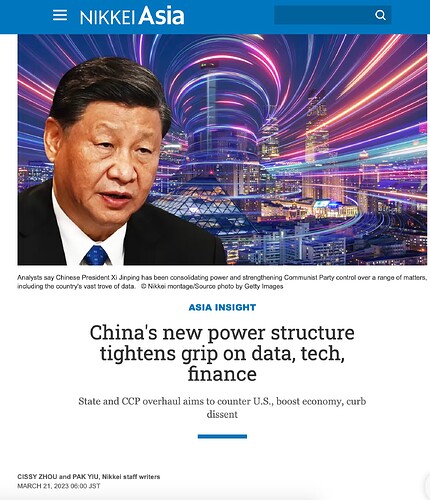-
1泽字节(ZB)大约等于1万亿吉字节(GB)。如果每一个吉字节是一块砖,那么1万亿(泽字节)就足以建造258座中国长城,而每座长城有近39亿块砖。美国网络公司思科的一位分析师曾这样描述世界上正在积累的惊人的数字数据量。
-
中国拥有约10亿互联网用户和庞大的监控网络,正在迅速成为该 "数据圈 "的最大部分。几年前希捷公司的一项预测估计,到2025年,中国每年产生的数据量将达到48.6泽字节,或占全球总量的近28%。面对美国出口限制带来的越来越大的压力、金融稳定的风险和经济增长的放缓,这些变化表明中国政府的优先事项。这些改革被视为对习近平和共产党的 “生存”。
-
在习近平的领导下,中国进行了改革,使其国家机构跟上现代国家和经济的步伐。这包括成立组织来监督其金融部门,促进其数字经济,与公众接触,以及管理香港和澳门。一个由中国共产党领导的委员会负责确保技术自力更生,以应对美国限制先进计算机芯片供应的影响。
-
中央科学技术委员会的成立被比喻为中国在20世纪60年代对核武器的追求,当时全国范围内的资源被调动起来以实现突破。重组后,现有的科技部将不再评估和指导具体项目,它的一些部门和职责将被移交给其他政府机构。
-
重组被认为是习近平巩固权力和加快他优先考虑的项目的一种方式。此外,不断增长的zettabytes库被视为获得全球优势的另一种手段。
-
北京已经加强了对科技公司收集的数据的监督,并出台了关于数据安全和个人信息保护的法律。国务委员肖捷认为这是一座经济金矿,数字资源和数字经济对经济和社会发展具有重要意义。
-
中国的数字经济发展迅速,2021年将达到45.5万亿元(6.6万亿美元),是2016年的两倍。新的国家数据局将协调国家不断膨胀的数字信息储备的共享和发展。人们对这个新实体将如何运作存在疑问,因为有几十个地方政府级别的 "大数据局 "和 “大数据管理中心”。
-
国家数据局被认为是一个经济项目,而不是一个安全项目,它将隶属于国家发展和改革委员会,而不是网络空间管理局。这是一项关键的工作,因为中国正在寻找一个新的增长引擎来弥补整体投资、消费和出口的放缓。
-
中国正在集中进行金融监管,一个新的国家金融监管局接管了银行和保险监管机构的一些职责。
-
还将成立两个新的党政机构,以加强意识形态和党在金融系统中的作用。
-
这些变化是出于安全考虑,北京将其监督香港的最高办公室重组为一个直接向共产党领导层报告的机构。
-
这个被称为共产党中央委员会香港和澳门工作办公室的新实体,将使中国共产党对这些城市的事务有更直接的控制。
-
其任务是 “维护国家安全,保障人民的生活和福祉,以及支持香港和澳门融入国家发展计划”。
-
资深中国政治评论员Johnny Lau说,该党的报告强调了国家安全,反映了中共对外国和外部势力仍能影响香港的担忧。
-
他表示,该党希望消除香港的任何威胁,表明意识形态在这场战斗中的重要性。
-
中国共产党(CCP)正试图加强其意识形态,防止香港和全国的社会动荡。严厉的大病政策和经济问题导致不满情绪升温,自2022年中期以来,自由之家的中国异议监测记录了1000多起异议事件。新加坡国立大学李光耀公共政策学院副教授Alfred Wu说,中国当局的行动是非常受意识形态驱动的。
-
中共设立了一个新的机构,即中共中央社会工作部,负责处理公众上访,指导行业协会和非国有企业开展 "党建 "工作。政治评论员刘晓明提出,"影响民生 "的事情通常是导致抵制的原因,并举出了诸如 "0-COVID "的挫折和老年人的抗议等例子。
-
中共加强意识形态和减少金融风险的努力是否有助于实现技术自立,还有待观察。邓小平说,现在预测这些全面改革是否有助于实现习近平的雄心壮志还为时过早。
-
1 Zettabyte (ZB) is enough to build 258 Great Walls of China, with nearly 3.9 billion bricks. China has around 1 billion internet users and is estimated to generate 48.6 ZB annually by 2025.
-
The Chinese Communist Party government and President Xi Jinping are aiming to tighten their grip on data and technology development, finance and society. These reforms are an extension of power consolidation since Xi took office in 2012.
-
The changes signal Beijing’s priorities in the face of increasing pressure from U.S. export restrictions, risks to financial stability and slowing economic growth. These reforms are seen as “existential” for Xi and the Communist Party.
-
Under Xi Jinping, China has undergone reforms to bring its state institutions up to speed with the modern state and economy. This includes the formation of organizations to oversee its financial sector, promote its digital economy, engage with the public, and administer Hong Kong and Macao. A CCP-led commission has been charged with ensuring technological self-reliance to counter the effects of U.S. restrictions on the supply of advanced computer chips.
-
The formation of the central science and technology commission has been likened to China’s quest for nuclear weapons in the 1960s, where nationwide resources were mobilized to achieve breakthroughs. The existing Science and Technology Ministry will no longer evaluate and shepherd specific projects after the restructuring, and some of its divisions and duties will be transferred to other government agencies.
-
The restructuring is seen as a way for Xi to consolidate power and accelerate projects he prioritizes. Additionally, the growing trove of zettabytes is seen as another means to gain a global edge.
-
Beijing has stepped up oversight of data collected by tech companies and introduced laws on data security and personal information protection. State Councilor Xiao Jie believes this is an economic gold mine, and that digital resources and the digital economy are of great significance for economic and social development.
-
China’s digital economy has grown rapidly, reaching 45.5 trillion yuan ($6.6 trillion) in 2021 and double the size in 2016. The new national data bureau will coordinate the sharing and development of the country’s ever-swelling stockpile of digital information. There are questions over how this new entity will work, with dozens of local government-level “big data bureaus” and “big data management centers”.
-
The national data bureau is seen more as an economic project than a security one, and will be under the National Development and Reform Commission rather than the Cyberspace Administration. It is a critical job, as China looks for a new growth engine to compensate for slower overall investment, consumption and exports.
-
China is centralizing its financial regulation with a new National Financial Regulatory Administration taking over some responsibilities from the banking and insurance regulator.
-
Two new party bodies will also be formed to strengthen the roles of ideology and the party in the financial system.
-
These changes are security-minded, with Beijing restructuring its top office that oversees Hong Kong into a body that reports directly to the Communist Party leadership.
-
This new entity, referred to as the Hong Kong and Macao work office of the Communist Party Central Committee, will give the CCP more direct control over the cities’ affairs.
-
Its mission is to “safeguard national security, guarantee people’s livelihoods and well-being, as well as support Hong Kong and Macao to integrate into the national development plan.”
-
Johnny Lau, a veteran Chinese political commentator, said the party’s report emphasized national security and reflected the CCP’s worries that foreign and external forces are still able to influence Hong Kong.
-
He stated that the party wants to eliminate any threat in Hong Kong, showing the importance of ideology in the battle.
-
China’s Communist Party (CCP) is attempting to strengthen its ideology and prevent social unrest in Hong Kong and across the nation. Harsh pandemic policies and economic issues have caused discontent to simmer, and Freedom House’s China Dissent Monitor recorded over 1,000 dissent events since mid-2022. Alfred Wu, associate professor at the Lee Kuan Yew School of Public Policy at the National University of Singapore, said that Chinese authorities’ actions are very ideology-driven.
-
The CCP has created a new institution, the social work department of the Communist Party’s Central Committee, to deal with public petitions and guide industry associations and non-state-owned enterprises in “party building” work. Political commentator Lau suggested that things that “affect people’s livelihood” are typically what lead to resistance, citing examples such as zero-COVID frustration and protests by the elderly.
-
It remains to be seen if the CCP’s efforts to strengthen its ideology and reduce financial risks will help to achieve technology self-reliance. Deng said it is too early to predict if these overhauls will help to realize Xi’s ambitions.
1 Like
